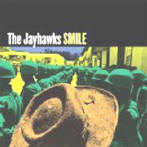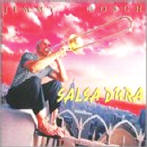 The Jayhawks
The Jayhawks
Smile
53:22
Alternative Country-Rock is a brand of country and rock music that emerged in the late sixties and reached its first plateau in the early seventies. Ever since the rise of pop acts like The Byrds, Gram Parsons, and Neil Young in the ’60s (with their emphasis on lyricism and rock sonic qualities) and country acts like the proverbial "outlaws" Willie Nelson, Waylon Jennings, David Allen Coe (who bucked the commercial and aesthetic concerns of traditional country music), alt-country-rock has become a vehicle for setting traditional country sentiments to music replete with moderate tempos, tight harmonies, a strong sense of melody, and an understanding of what exactly country music should sound like. Even today, alt-country-rock has remained true to these conditions—often combining country sentimentality with a musical iconoclasm. There’s been punk/grunge sounds fitted to country music formalism (Neil Young), pop/rock production techniques employed instead of staid Nashville techniques (Wilco, Whiskeytown), and when alt-county-rock artists show a commitment to social concerns (Lucinda Williams, Blue Rodeo) a certain authenticity often not found in today’s young country format clearly comes to the fore.
Since 1986, The Jayhawks, with their jangling guitars, upper-registered vocal harmonies with slow tempo-ed ballads, have long served as a paragon of alt country-rock. On their latest recording, Smile, they tread a bit beyond this familiar territory, offering their old and new listeners and something broader in appeal. Produced by veteran Bob Ezrin (producer for Alice Cooper, of all people), Smile is a collection of smooth, slick, countryish tunes that lean more toward pop than country rock. On one hand this may be a bit dismaying to their old fans, those whose are familiar with a strong sense of roots music long the staple of the Jayhawks. On the other hand, this seeming departure from the conventions of alt-country is not a bad thing. In fact, the sonic twists that Ezrin incorporates into the sound of the ‘Hawks’ lyrical sentiments work quite well. Instead of another fine alt-country recording by the Jayhawks, one gets a very listenable, hummable, memorable recording; one that may very well entice new listeners over to the genre and the back catalogue of the ‘Hawks.
Opening with the sonically brilliant title tune, Smile is grand in both construction and production. Where all the trappings of alt-country are present—great lyrics and melody—Ezrin has added violins and covered the vocal harmonies with a Bee-Gee-esque patina. The result makes the listener pay attention to the sheer musicianship of the ‘Hawks. Similarly, the traditionalism of "I’m Gonna Make You Love Me" grabs listeners, but this time not from its sonic force, but instead from the sheer craftsmanship of this alt-country classic. It has great hooks, great harmonies, superb ringing guitar lines, all the things that make a great alt-country tune.
Where these two songs show a certain musical stretching by the ’Hawks (and there are other excellent cuts on this CD that show them to be a first-rate ensemble: "What Led me to This Town," "Queen of the World,"), it is on "(In My) Wildest Dreams" that we clearly hear the new Jayhawks. Fast, funky, electric, beat-heavy; if this tune is the direction the ‘Hawks want to take, I think they’re on the right track. Part Bruce Cockburn’s radical point of view, part electronica production, part Traveling Wilburys’ vocalizations, part screaming guitar, this tune is fresh and imposing, and under the right circumstances could make the Jayhawks a very important popular band, moving them outside their current status as alt-country legends. Highly recommended.
 Jimmy Bosch
Jimmy Bosch
Salsa Dura
57:38
Born in New Jersey, Jimmy Bosch picked up the trombone at age eleven. By thirteen he made his first professional appearance in the Hoboken merengue band, Arcoires. By 1978 he enrolled in the classical music department at Rutgers, but by his third year, he was through, out the door on the road learning music the real way.
As a member of the influential 1980s salsa band, Manny Oquendo Y Libre, Bosch became well known for his flaring melodies and soulful rhythms and was one of the leading trombonists in contemporary Latin music. After playing with Rueben Blades, Eddie Palmierei, and Celia Cruz, he and his band The Masters were sought out by RykoLatino, the newly opened Latin label of Rykodisc. On his 1998 debut, "Soneandro Trombon" ("Singing Trombone"), Bosch had his pick of some of the leading Latin performers in the world: Cuban trumpeter, Chocolate Armenteros and vocalist Peter Rodriguez. On this current recording Steve Turre, Davis Sanchez and Puerto Rican percussionist Richie Flores are featured.
There is no getting around it; Salsa Dura is a dance record. Bosch plays a whole range of Latin dance tunes: salsa tunes, sescargas, boleros, mozambiques, plenas, guajiras … all imbued with verve and prima verde. But more importantly Bosch’s work is political, not in the sense that he wants the listener to enter the big-P-Political arena, but in the sense that by addressing events and issues important in their audience’s popular culture, this audience gains a certain power and respect. Bosch’s dances are laced with lyrical sentiments aimed not at the old-time salsa aficionado, but instead at a newer, younger audience who have different traditions in their everyday life. The result is music full of improvisation and music that has a conscience, one that is both thought-provoking and accessible.
For instance, the opening number "La Cacharra (The Jalopy)" is about how disempowered someone feels when their car runs out of gas. Similarly in "La Noticia" a musician’s life is put into proper perspective when his tour is cut short by the news of his brother’s street death. Although he is on top of the proverbial musical world, he learns that the street is the greatest equalizer.
Bosch’s work genuinely reflects a new movement in salsa music: Salsa Dura. The inherent good-time feeling of much of earlier salsa music is now filled with a social consciousness that is more directly aimed at the life-experiences of its listeners. Not to suggest that salsa has been irrelevant, but with this new attitude ascribed to it, the music and musicians become more urgent and representative of the current issues informing much of the Latin community. And all this is a step in a good direction. If these musicians and their newfound politicized attitudes could address the issue that still remains very low on the Latin political landscape: the role of women within the musical ensemble (only 1 out of 16 musicians pictured in Bosch’s outfit is a woman), their political stance would be ever so much stronger. Hopefully, if the progressivism found in Salsa Dura continues, and Bosch maintains his superlative musicianship, his next recording might aptly be called "Sinceramente Yo Quiero Echar Pa’ Lante (I Sincerely Want to Move Forward)"
Signed Elements ©
Individual Authors
Unsigned Elements © Agenda Publications, LLC
